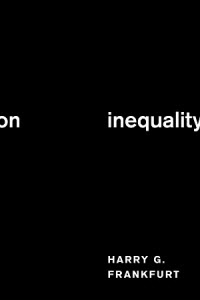On Inequality by Harry G. Frankfurt, Princeton, N.J.: Princeton University Press, 2015, 120 pages.
For most of the postwar era, concerns about economic equality have been relegated to the sidelines of mainstream macroeconomics. In recent years, however, equality has become more salient in economics literature, one recent example being the surprise success of Thomas Piketty's Capital in the Twenty-First Century. Now, one of the country's most famous philosophers, Harry Frankfurt, joins this debate by asking the daring question: Is equality as important a moral good as other human values?
Frankfurt, a Princeton University professor (now emeritus), asserts that those who oppose economic inequality are making a misguided assumption. By defining equality as an inherent moral good, he contends, we mistakenly focus on a person's standing relative to others rather than addressing how we can meet that person's most basic material needs. As a result, our target is a certain level of wealth that has nothing to do with a person's actual circumstances and wants.
When we make such claims, Frankfurt explains, it is in part because it is much easier to define what is "equal" (everyone gets the same) than it is to define what is "enough." By "enough," Frankfurt emphasizes that he is not referring to subsistence levels, but what a person needs so that he feels reasonably satisfied, so that "he does not resent his circumstances," as Frankfurt puts it. Another common error among inequality opponents, to Frankfurt, is that they conflate the effects of inequality with inequality itself. "Whenever it is morally important to strive for equality, it is always because doing so will promote some other value rather than because equality itself is morally desirable," he argues.
But isn't a needy individual happier and better off if he or she gets more of a desired good that others have in abundance? Not necessarily, contends Frankfurt. We may try to distribute something valuable, such as food or medicine, to a group of impoverished individuals, and we can avoid inequality by making sure that everyone gets the same amount. But if the allotted portion of food isn't enough to end nutritional deprivation, or if the dosage of medicine isn’t enough to bring people back to health, the group continues to suffer. This is one reason why defining what is "enough" is a moral imperative for Frankfurt.
Frankfurt goes on to dissect an economics term — diminishing marginal utility — with the tools of a philosopher. He takes aim at the view of the late economist Abba Lerner that because one person's enjoyment of a particular good declines as he or she acquires more of it, equality will maximize aggregate happiness as more people share in the enjoyment of that good. This view is incorrect, Frankfurt argues, because there are many instances where each marginal unit is still equally desirable if it follows or is joined by another. A good example would be a collector who acquires one more item, but is far from being done and "satisfied." And sometimes there are cases when enjoyment increases with consumption — say, addiction.
Frankfurt makes clear to the reader that he is not arguing from an anti-egalitarian standpoint as such. He contends that his central case — egalitarianism has no inherent moral value — does not mean he opposes attempts to reduce inequality. In fact, he writes, he supports many of these efforts. But these steps are means to an end, namely, to achieve "socially or politically desirable aims" that do have an inherent value.
Frankfurt keeps his focus on the philosophical argument rather than policy prescriptions. But if a lawmaker or economist were to apply his reasoning to policy, it might imply that inequality opponents should look to improving resources and opportunities for the neediest rather than equalizing the material conditions of those on the middle and upper tiers of income and wealth.
Frankfurt closes by discussing the concept of respect, and why it should matter. As he defines it, equal treatment is quantifiable and unrelated to a person's circumstances; as such, equality is wholly impersonal. Respect, by contrast, is completely personal, because it is the acknowledgement by one person of another's unique needs and achievements. When someone complains that he or she is not respected, what they mean is that someone is refusing to "acknowledge the truth about them," Frankfurt explains. When someone is denied respect, "it is as though his very existence is reduced."
The reason why respect and equality need to be jointly defined and addressed is that most people confuse the two, Frankfurt concludes. And this personal angle is why the broader debate over inequality has taken on such resonance. When someone demands equal treatment, what he or she is most likely asking for is respect — that is, an acknowledgement of the reality of their personal lives.
With this book, as in his past work, Frankfurt has shown why it is so important to question common terms that are too often used reflexively. Regardless of one's own views on the past, present, and future of inequality, On Inequality is a salutary effort to help readers pause and think about the beliefs that motivate our rhetoric.




